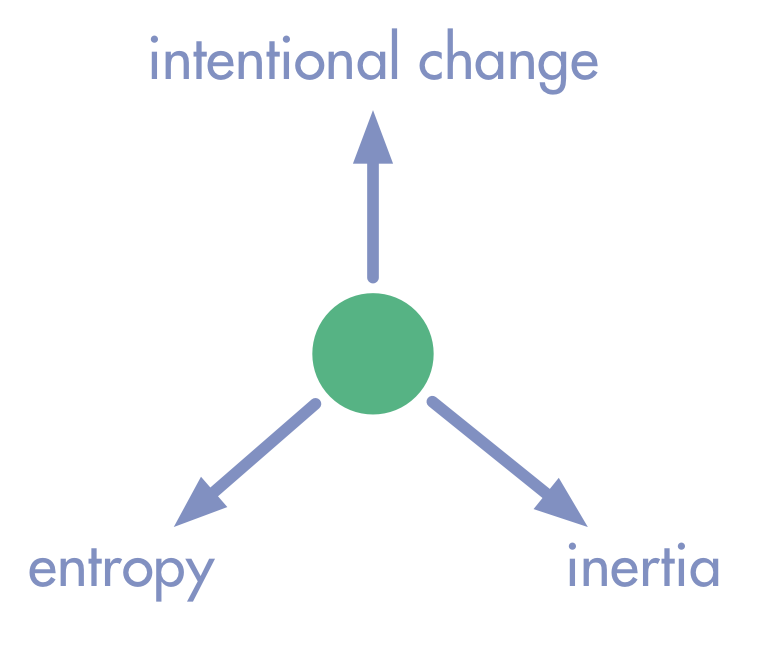
by Bernhard Bockelbrink | May 7, 2016 | blog, Change, eBooks, Sociocracy 3.0
download pdf download ePub
Introduction
Change in organizations is inevitable and happens naturally as organizations adapt to the various forces pulling at the organization, from the outside and from within.
However, most of the changes that take place in organizations are neither intentional nor aligned across the organization, they happen locally as a result of many small choices made by many individuals.
Lots of small and unrelated adaptive changes will lead to giving in to inertia (doing more of the same) and entropy (many independent and unaligned decisions). This is the opposite of intentional change – changing in an organized and aligned way.
All organizations benefit from building capacity for intentional change in order to become and remain effective.
This paper presents a simple model for mapping influence of internal and external forces to organizations, identifying motive for change and delegating accountability for plotting a course of action, and finally incrementally implementing the resulting change. (more…)
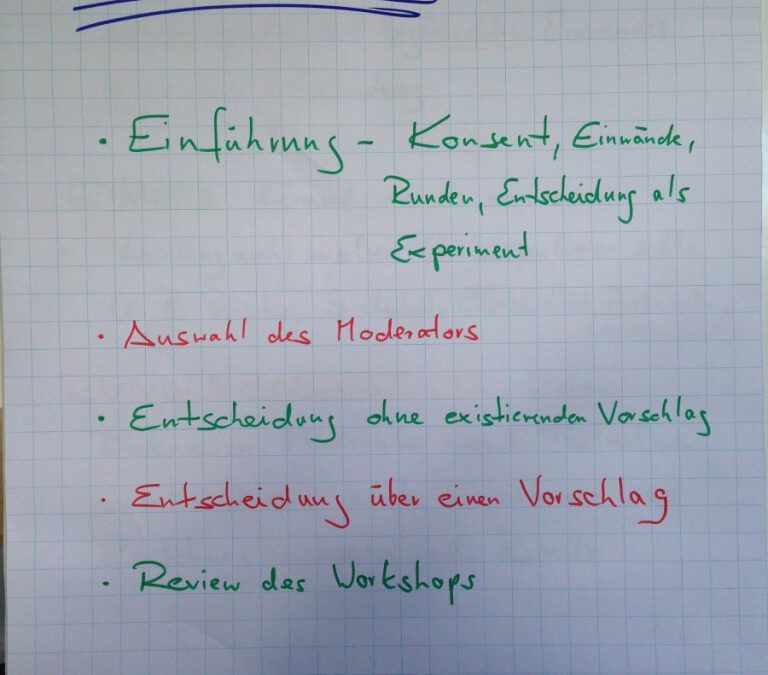
by Bernhard Bockelbrink | Apr 17, 2016 | blog, Sociocracy 3.0, workshops/trainings
Für alle, die die Flipcharts nicht fotografiert haben, die Fotos als pdf zum Download oder unten zur Ansicht. Detailliertere Materialien dazu gibts auf sociocracy30.org.
Vielen Dank an die Teilnehmer! (more…)
by Bernhard Bockelbrink | Jan 19, 2016 | blog, distributed organizations
This is a collection of short reviews of software tools to facilitate online collaboration. The use cases I have been looking at are as follows:
- virtual team events (like planning, reviews, retrospectives, daily standup, proposal forming, navigation meeting, trainings or topical workshops)
- asynchronous collaboration of virtual teams
- virtual coaching sessions
- webinars
(more…)

by Bernhard Bockelbrink | Jan 16, 2016 | blog, Sociocracy 3.0
Many of the illustrations I have created for S3 are now available as high-resolution PNG files through GitHub and Dropbox.
You can re-use them under a Creative Commons Attribution-ShareAlike 4.0 International License.
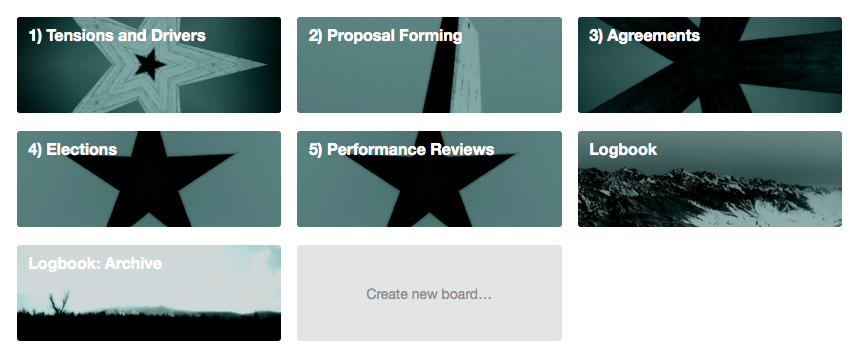
by Bernhard Bockelbrink | Jan 13, 2016 | blog, Sociocracy 3.0
I am working on a guide explaining how to implement Sociocracy 3.0 using Trello with co-located and distributed teams. In the first part, which is already online, I explain the basic ideas, the general layout, and how to use the Trello boards for identifying drivers[^driver-guide], proposal forming and consent decision making.
It’s really easy to get started, I have prepared template boards for you to copy, no additional setup required. What’s more, you can use the system itself for adapting the system to your specific needs. If that isn’t too meta to you ;-).
Part 2, published in due time, will describe the processes of selecting people to roles, performance reviews, and how to review drivers, agreements and role definitions.
The guide is available at https://evolvingcollaboration.com/s3-with-trello/.
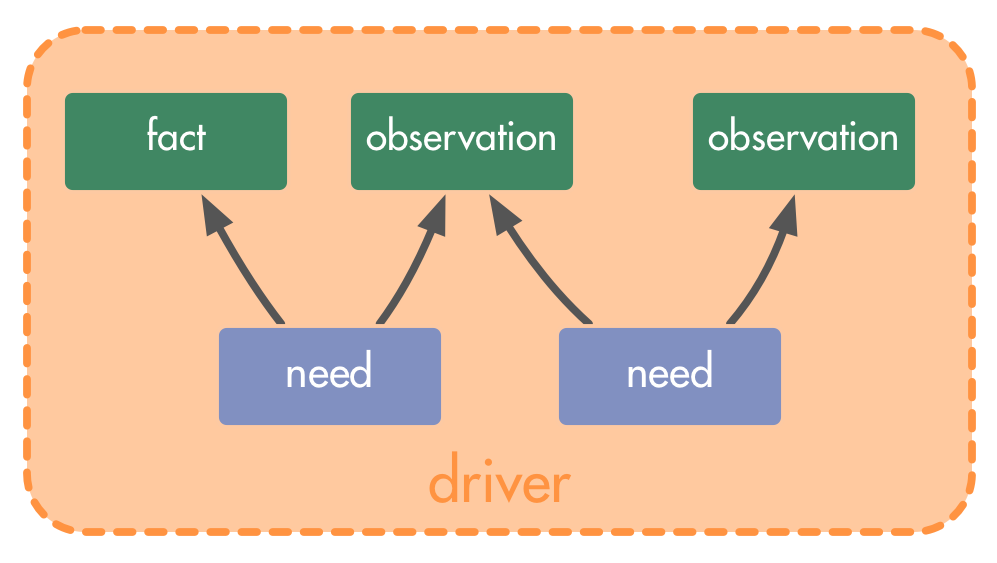
by Bernhard Bockelbrink | Jan 13, 2016 | blog, Sociocracy 3.0
In this guide, you will discover the relationship between your assumptions and your achievements, and how being aware of your motivation for action – which we call a driver – can significantly improve your chance of success both at work and in your personal life. You will learn how to easily identify, understand and agree on drivers, and see how to develop projects and organize collaboration around drivers.
The Power of Assumptions
We’re used to planning and developing ventures and collaboration – products, projects, jobs, careers, teams, departments and even entire organizations around our assumptions or predictions about what constitutes a desirable and achievable future: goals, objectives, aims, strategies, purposes and visions.
Even if they often started out as a wild guess we only rationalized afterwards, the more we weave our predictions into a coherent and convincing narrative, the more they tend to take a life of their own and obscure our initial motive. But as soon as we begin confusing our assumptions with reality, the outcome is inevitably hit and miss: even if we reach our goals or realize our vision we often discover that the future we ended up with is not where we want to be. (more…)
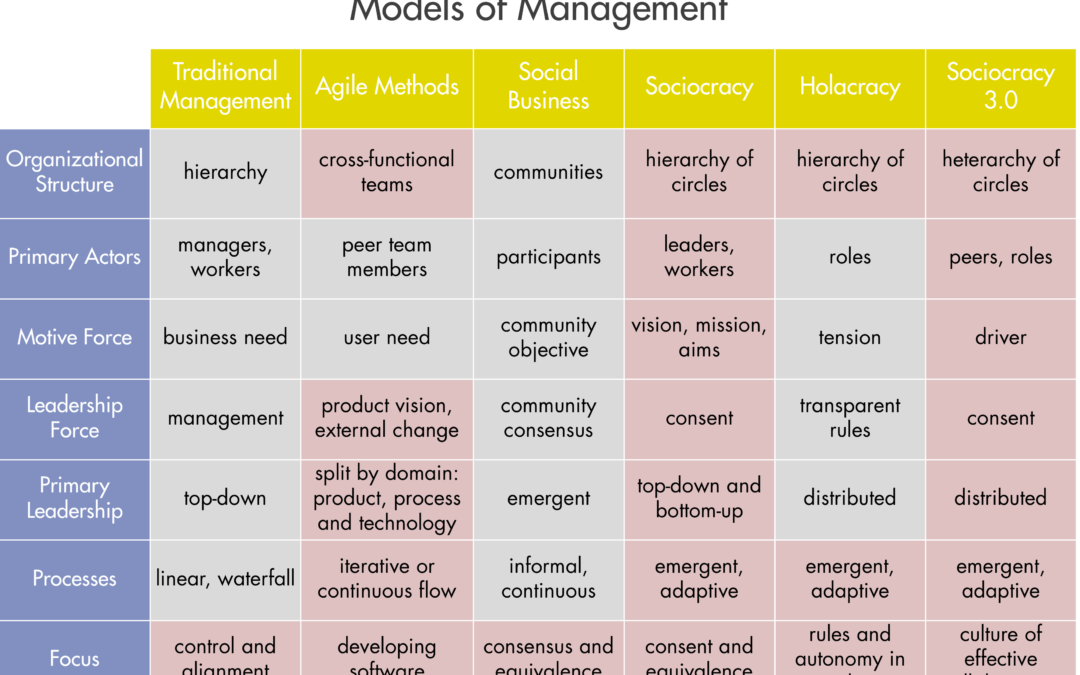
by Bernhard Bockelbrink | Oct 19, 2015 | blog, sociocracy, Sociocracy 3.0
A while ago I stumbled upon Don Hinchcliffe’s “Comparing Various Models of Management with Holacracy” and found it curious he’d left out sociocracy.
I assume he’s not even aware that Holacracy started out as a mere copy of Sociocracy, so I decided to fill in the blanks, and add both Sociocracy and Sociocracy 3.0 to the picture.
My additions and changes are highlighted in red.
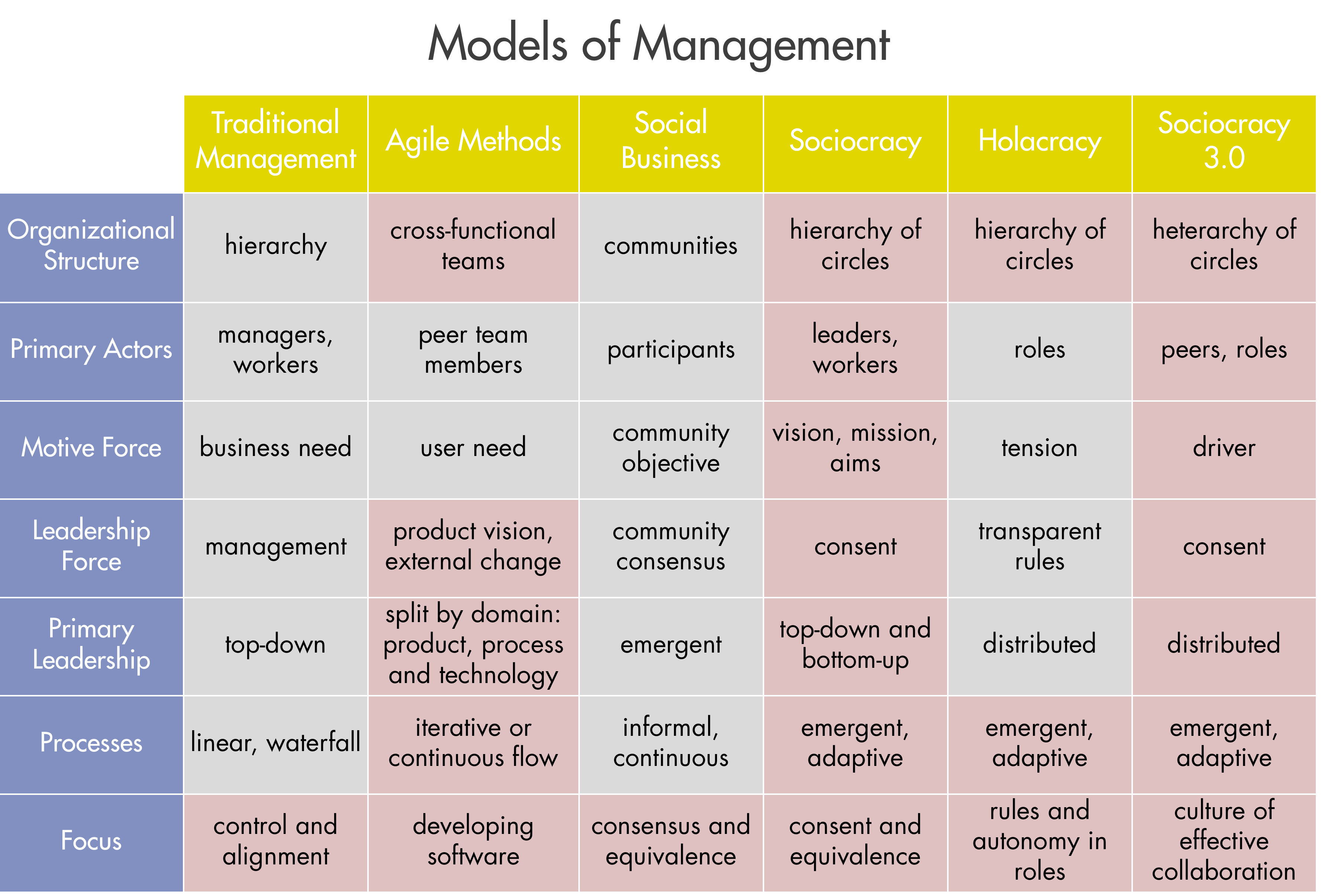
by Bernhard Bockelbrink | Oct 15, 2015 | blog, sociocracy, Sociocracy 3.0
Consent is reached if, and only if, each and every member of a circle, after understanding the problem and thinking through the proposal in all its detail and implications, honestly states that they currently see no objection against implementing the proposal.
Everything else is not consent.
It’s not consent if somebody could not be bothered to prepare for the meeting and read the proposal. It’s not consent if someone after an exhausting meeting simply does not care and says “I have no objection” just to get it over with. It’s not consent if somebody misunderstood the problem, or (part of) the proposal.
The consequence of no consent is no agreement. No agreement is fine as long as there’s a shared understanding that there’s no agreement. Thinking we have an agreement, when in fact we don’t, is dangerous.
We may be tempted to believe that this just a problem for the individual: even if they misunderstood the proposal, they still have to adhere to the agreement. In fact, however, this is a massive risk for the whole circle: Without consent, we have not used all the knowledge available to determine that the proposal is good enough for now and safe enough to try. In other words, the proposal may very well be not be good enough, or not safe enough to try.
Understanding this will change our paradigm: For an organization to build a solid culture of “informed” consent it requires a lot more than just sticking to the meeting format and holding each individual accountable for their consent. We now hold everyone accountable for us all understanding that everyones consent is essential. For supporting each other to make sure there is consent, for watching out for each other, and creating a space where it is possible for each and every one of us to engage with each and every decision. Again and again, every time we make an agreement.
This is why we love proposal forming so much, it gives everyone the space and time to engage with a problem. The chances that we all understand a proposal we co-created are just so much higher. This is also why the tuners need to be aware of the rest of the group while tuning a proposal: the amount of creativity they can bring into the proposal when bridging ideas or adding new ones is limited to what the rest of the circle can consume and still achieve consent. With every circle, this changes over time, so we need to constantly watch it.
So sometimes you might say, “I have a concern: I do not think this is good enough for now and safe enough to try, because I’m afraid that some of us did not understand the proposal.” And if that happens over and over again, there’s a tension to be processed.
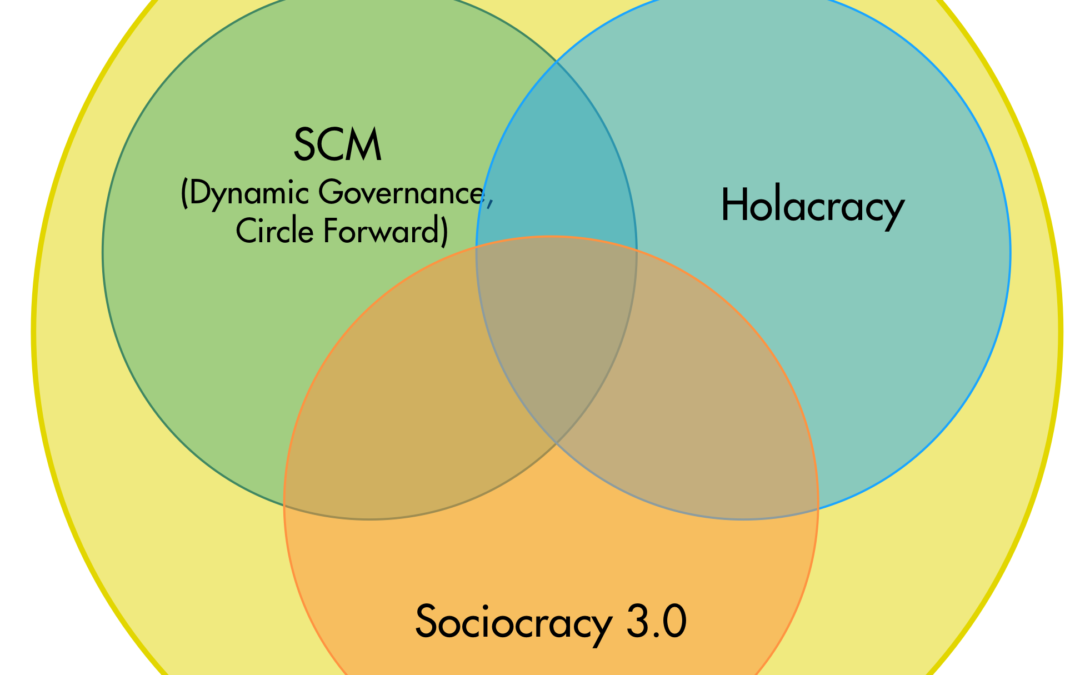
by Bernhard Bockelbrink | Oct 9, 2015 | blog, sociocracy, Sociocracy 3.0
When I refer to “sociocracy” with a lowercase ‘s’, I refer to any system of running organizations where power (and decision making) is distributed to all members[^advocats of Holacracy would claim it’s roles and not people] of an organization through the principle of consent, and emergent knowledge is captured and integrated into working agreements[^policy] through objections.
Also, I refer to organizations governed with such a system as “a sociocracy” (as we would refer to some countries as “a democracy”).
Today we have three major flavours of sociocracy (with a lowercase ‘s’):
- The Sociocratic Circle-Organization Method (SCM), as advocated by The Sociocracy Group (TSG), these days they simply call it Sociocracy (with a capital ‘S’). This method is also known as dynamic governance or Circle Forward in the USA1
- Holacracy, a development of SCM by Brian Robertson and HolacracyOne, influenced by agile methodologies and the ideas of Ken Wilber, with the intention to making sociocracy available to the corporate world
- Sociocracy 3.0, developed from both SCM and Holacracy, and integrated with as well as other lean and agile methodologies, in order to make sociocracy (with a lowercase ‘s’) available to as many organizations as possible. S3 is stewarded by the S3 Working Group.
It is a good thing we have a bit of diversity within sociocracy, because through that we can help many more organizations thrive. We could have a bit more exchange, but that is going to change soon.
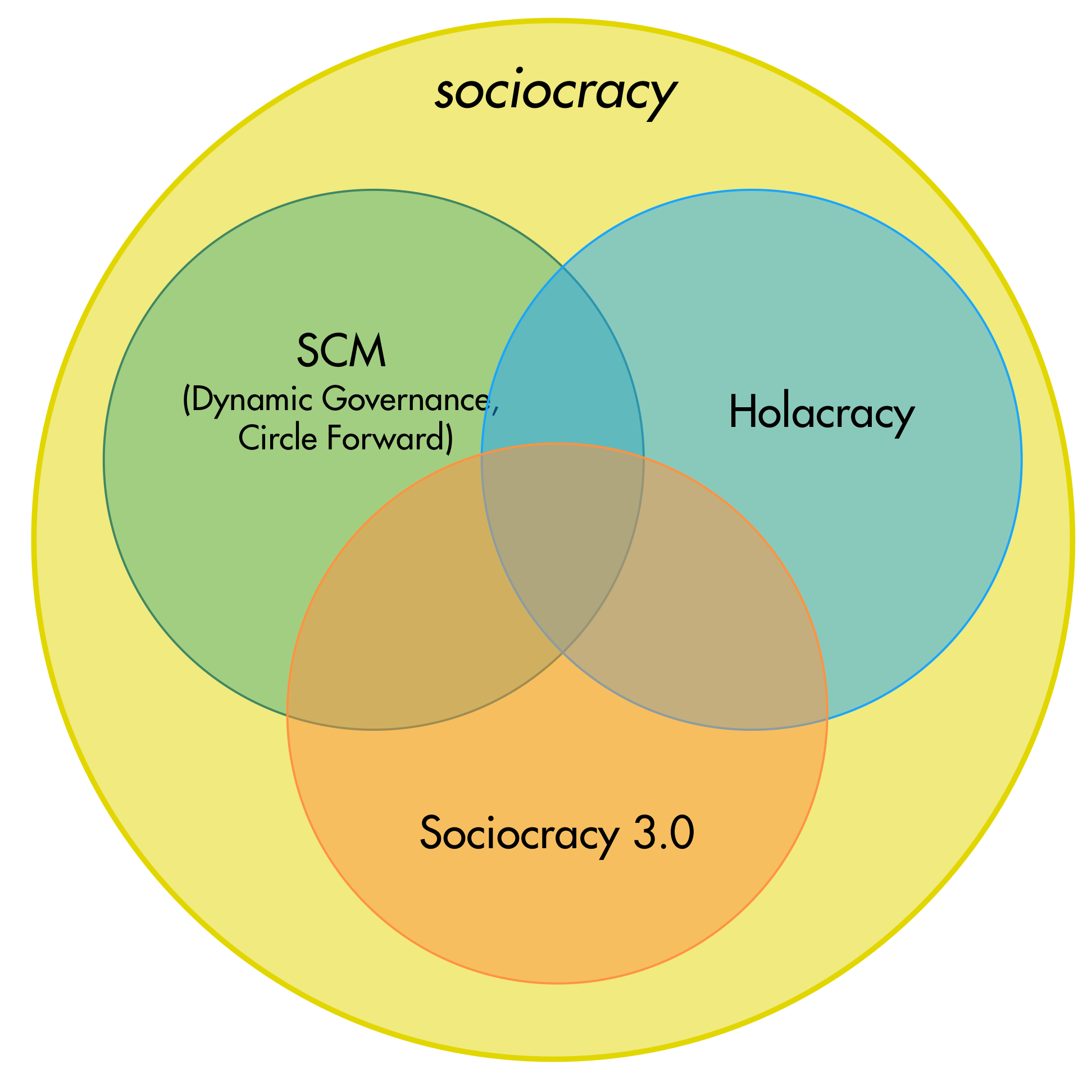
by Bernhard Bockelbrink | Oct 9, 2015 | blog, Sociocracy 3.0
It’s perfectly fine to hold workshops outside our organizations, but we need to be aware that often the conclusions we reach and the deep shared understanding we experience might no longer hold true when we are back at our workplace. It’s easy to be creative, bond with our teammates and create an illusion of breakthrough and enlightenment when you are in a fresh environment, and free of the shackles of habit and organizational culture. Facilitators and trainers often (consciously or subconsciously) use that to their advantage to create a group hallucination of an imminent revolution.
These occasions are fine to get a fresh perspective, but translating new and radical ideas and plans from these workshops or retreats to our everyday setting is a challenge, and we often get frustrated as resistances emerge and we encounter aspects we haven’t thought of before. Culture and habits still hold us in a tight grip and confine us.
For Sociocracy 3.0 to stick with our organization, it needs to stick with each and every member of that organization. We cannot achieve this through policy and rules we create outside, we need to go on a journey together and incrementally evolve our organizational culture, our shared understanding, our mindset, our habits. How we can achieve this largely depends on the culture we have, and if we don’t want to loose sight of that, we better hold workshops to change culture submerged in that culture.
It’s fine to bring in facilitators, trainers and coaches from outside, but however much we’re tempted to run away and feel the freedom, let’s stay inside the organization and stick to the change we can create here. It might appear slow at first, but it will save us a lot of time and frustration in the long run.









